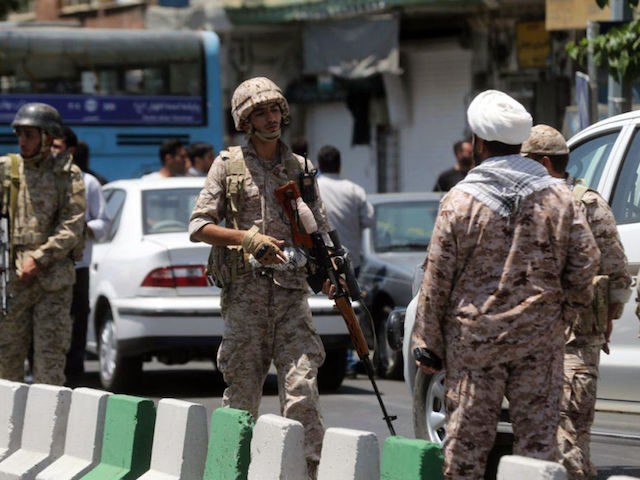The Iranian Revolutionary Guard Corps (IRGC) have accused Saudi Arabia of organizing an Islamic State attack on Iran’s Parliament and the shrine of the leader of the Iranian revolution, Ayatollah Ruhollah Khomeini. The Islamic State have officially taken responsibility for the attack.
At press time, Reuters reports that the IRGC say Saudi officials coordinated the attack, which left at least 12 dead and 42 wounded.
JUST IN: Iran's revolutionary guards say Saudi Arabia was behind deadly attacks in Tehran – statement pic.twitter.com/WiYtd5ypVH
— Reuters Top News (@Reuters) June 7, 2017
The Agence-France Presse reports that the IRGC claim America is also “involved” in the attack in some way:
#BREAKING Iran Guards claim US, Saudi 'involved' in Tehran attacks
— AFP news agency (@AFP) June 7, 2017
“Let there be no doubt that we will take revenge for today’s attacks in Tehran, on terrorists, their affiliates, and their supporters,” Brigadier General Hossein Salami, the deputy commander of the IRGC, said in a statement, according to Russian propaganda outlet RT.
Iranian state media responded to the attack by publishing articles quoting Saudi officials’ recent statements against Iran, implying that, at the very least, Saudi Arabia inspired the Sunni Islamic State terrorists to attack the centers of power in Shiite-majority Iran. An estimated eight percent of Iran is Sunni Muslim, compared to 89 percent Shiite.
“Saudi Arabia’s deputy crown prince Mohammed bin Salman in challenging remarks made a few weeks ago warned that his country would take the battle to Iranian soil,” the state-run Fars News Agency recalled Wednesday morning. Bin Salman had reported noted in May that the Iranian government perceived Riyadh as a “primary target” for state-sponsored terrorism, and said: “We won’t wait for the battle to be in Saudi Arabia. Instead, we’ll work so that the battle is for them in Iran.”
Fars also quoted Saudi Foreign Minister Adel al-Jubeir in a separate article, who told officials in France that reported indicated Iran was harboring al-Qaeda terrorists. According to Fars, al-Jubeir “said Iran must be punished for what he claimed as interference in the region and support for terrorist organizations.” Al-Jubeir reportedly demanded Iran become a “normal state,” not a sponsor of terrorism, and abide by international law, in a report published hours before the Islamic State attack.
The articles do note cite similar remarks from Iranian officials. In May, for example, Iranian Defense Minister Hossein Dehghan warned that Tehran would “leave no area untouched” of Saudi Arabia “except Mecca and Medina,” the holy cities, if Iran felt threatened.
Iran’s Supreme Leader, Ayatollah Ali Khamenei, has repeatedly claimed the United States, Israel, and “the West” created the Islamic State to keep the Middle East destabilized. In recent remarks, he mocked the West for losing control of what he claimed was their own creation: “This is a fire that [Western powers] themselves ignited and now has backfired on them.”
A combination of armed attackers and suicide bombers targeted the two locations in the Iranian capital Wednesday, with Iranian officials identifying one of the suicide attackers as female. The gunmen, dressed as women and carryingKalashnikov rifles, executed a siege on the Parliament that lasted four hours before Iranian law enforcement announced that they had killed all assailants. The attack interrupted an active Parliament committee session.
ISIS suicide bomber detonates himself at Imam Khomeini shrine south of Tehran. #pt pic.twitter.com/Vb0CPh2SGA
— Hayder al-Khoei (@Hayder_alKhoei) June 7, 2017
Videos began surfacing on social media of the attack, indicating that the gunmen wore body cameras to ensure their attack was documented. In one of the videos, a man is heard repeating phrases popularized by late ISIS propagandist Abu Mohammad al-Adnani.
The attack is the latest in what is shaping up to be the bloodiest Ramadan in recent memory. Ramadan is the holy month of Islam, in which jihadists believe their acts of violence will reap them more rewards in Jannah, the afterlife.

COMMENTS
Please let us know if you're having issues with commenting.